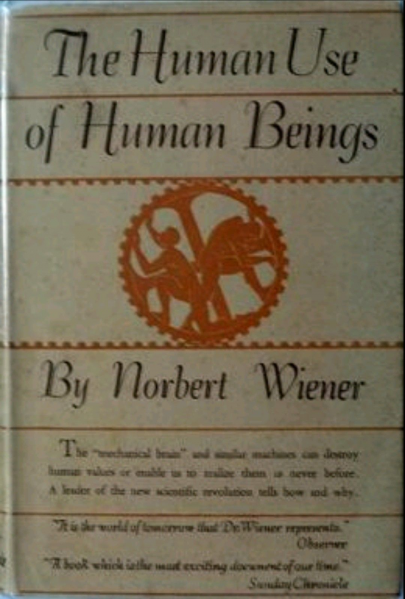Human use of Human Beings
Contents
Full Title or Meme
"The Human Use of Human Beings"[1] was published by Norbert Wiener in 1950 and was revised later to exclude some controversial material. That original book is available online at this link.
Context
"It is the thesis of this book that society can only be understood through a study of the messages and the communication facilities which belong to it; and that in the future development of these messages and communication facilities; messages between man and machines, between machine and man, and between machine and machine, are destined to play an ever-increasing part."
While recent proposals to asymmetrically slow AI advances seems hopelessly naive from a game theory perspective, there does seem to be some value in considering long-term ramifications, safeguards, and Vulnerabilities created by advances in Artificial Intelligence. Norbert Wiener's combined enthusiasm and caution towards the AI that would be born from Cybernetics half a decade later is insightful and notable.
Ideas
Progress
The population seems to swing between valuing social and technical progress as a benefit to an extreme rebellion and a desire to return to an old "Golden Age". The past century went through many wild swings between appreciating the advances and cursing the evils brought about by change. What is most troubling is that the rate of change seems to have risen to the point where most of the population of the world cannot adapt to change at this accelerating pace. A pace that Artificial Intelligence (Wiener labeled it "an artificial external cortex") can only accelerate this rate of change further.
"it is certainly true that the whole scale of phenomena has changed sufficiently since the beginning of modern history to preclude any easy transfer to the present time of political, racial, and economic notions derived from earlier stages." He then goes on to recite all the reason we all know for why the current direction of the consumer economy cannot continue, even though this was known to John M Keynes decades earlier. See the wiki page on Capitalism for a discussion that that topic.
Colonization
European Settlements across the globe were viewed as necessary to the growth of the mother country, but inevitably ran into the challenges about who ruled the colonies, the mother country, the settlers or the indigenous people.[2] The following quote was taken from a book by Edmund Burke in King George III's library at Windows castle.An Account of the European Settlements in America is an account of Britain’s colonies in North America by the writer and politician Edmund Burke. First published in 1757, the Account gave a history of European settlement in the Americas, the customs of the Indigenous population and the commercial importance of colonial possessions to the interests of the major European powers. The book demonstrated Burke’s views of colonies as being important possessions European powers. With regard to Britain's colonies in North America, Burke believed that while they were integral to Britain's economy, Parliament should have little interference on their governance. Such arguments became increasingly contentious over the next two decades and Burke’s Account was regularly reprinted.
Modern Slavery
Several governments in the British Commonwealth have passed acts requiring organization operating in their countries to attest to the use only of humanely sourced products.
One good example of a Modern Slavery Statement was published by Avast in 2021.Our culture at Avast can be described based on the 5 A’s Principles: Adult relationships (based on mutual trust, transparency and maturity), Accountability, Achievement focused, Autonomy and Asynchronous working. We offer high levels of flexibility, with many staff on work from anywhere contracts.
Hayek's Principle
“So long as the intent of the act that harms me is not to make me serve another person’s ends,its effect on my freedom is not different from that of any natural calamity."[3] Hayek’s contortions—his attempts to preserve commitments both to freedom and to élitism — are most evident in his concept of coercion. Coercion, Hayek tells us in the first chapter of “The Constitution of Liberty,” his magnum opus on free societies, is “such control of the environment or circumstances of a person by another that, in order to avoid greater evil, he is forced to act not according to a coherent plan of his own but to serve the ends of another.” The result was his slavish devotion to some the the most reprehensible people he knew, like the Chilean military dictator Augusto Pinochet, who had overthrown Chile’s democratically elected Socialist leader, Salvador Allende, in a violent coup.
References
- ↑ Norbert Wiener, The Human Use of Human Beings MIT (1988-03-22) ISBN 978-0306803208
- ↑ Edmond Burke, An account of the European Settlements in America. Fifth edition. v. II 1770 https://www.rct.uk/collection/1022393/an-account-of-the-european-settlements-in-america-fifth-edition-v-ii
- ↑ Corey Robin, Hayek, the Accidental Freudian The New Yorker 2024-06-29 https://www.newyorker.com/culture/the-weekend-essay/hayek-the-accidental-freudian
